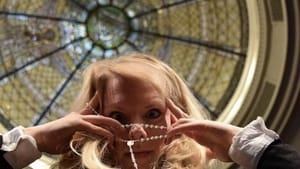Stay in the Loop
BSR publishes on a weekly schedule, with an email newsletter every Wednesday and Thursday morning. There’s no paywall, and subscribing is always free.
You can take the girl out of church...
Kelly McCaughan presents 'Catholic Guilt'

Kelly McCaughan’s Catholic Guilt, a solo show running at West Philly’s Calvary Center for Culture and Community, is a reminder that you can quit going to church, but you never lose that chapel muscle memory.
Today, when I must attend church for family functions, I take a seat as near to an exit as I can, because dropping into the pews makes my throat tighten. Interesting architecture or a window makes it easier to bear. McCaughan can probably relate.
She draws the audience into the Masses that steeped her childhood and teenage years in Pittsburgh. She performs on a small chancel, with peeling white paint and a dome of evening-dark stained glass overhead. We sit, stand, sit, stand, recite, and kneel on cue. It takes me right back.
“Deliberate impure thoughts”
With endearing vulnerability, commitment, and candor, McCaughan offers a primer on growing up Catholic in the ‘80s and ‘90s. She covers everything from elementary-school lessons on hellbound mortal sins to teenage sexual fantasies about the oddly appealing figure on the cross.
There’s the magical First Communion gown and the weirdness of lace-festooned little girls, mouths agape for the wafer. (“Jesus’s body is in my body?!”) McCaughan recounts a dance-floor-grinding incident at her “cosmic bowling” youth group (including a letter to the parents of all involved), and her first attempt at masturbation, at age 14, before realizing Jesus was watching.
We, the congregation, engage in several heartfelt prayers, including for the “teachers who have no choice but to blame their rancid stress farts on the children.”
Making a stranger of your own voice
I wasn’t raised Catholic, but I might as well have been. I grew up in a small and somewhat wacky faith based on the Bible plus the voluminous late-18th-century theological works of Swedish scientist and philosopher Emanuel Swedenborg.
Swedenborgians have a eucharistic ceremony they call “Holy Supper,” but fortunately their attachment to the wine and wafers is purely symbolic. I never had to wrestle with notions of magically cannibalizing bits of Jesus.
But Swedenborgians do have some wildly specific visions of the afterlife. They also have repressive ideas on women, sex, and marriage that would make any Catholic bishop proud.
McCaughan recount the crisis of faith she experienced after taking an Eastern philosophy class during her sophomore year of college at Indiana University of Pennsylvania. It was as if someone else was trying to speak to her inside of her own mind. “That ‘someone else’ was my own voice,” she recalls, a voice she had never been allowed to hear. It was a “devastating” and “terrifying” discovery.
The performance runs swiftly, at about an hour. Under director Carly L. Bodnar, the use of humorously ruminative voiceovers adds texture to McCaughan’s physical performance, which seamlessly involves the audience in some of Catholicism’s more anxiety-inducing rituals. Chancel projections (thanks to technical director James Jackson) offer real glimpses of McCaughan’s school days, from First Communion to the junior-high luau to dorm-room hijinks.
What do we believe?
McCaughan’s language makes you wonder whether Catholicism is a practice or an identity (or whether she isn’t as far from her faith as she professes herself to be). In Catholicism, she says, “we believe.” Where does the artist fall inside that “we?”
She also holds onto some easy shorthand around sex for women, referring to losing her virginity and many “walks of shame” in college — terms with rather poisonous resonance for a truly sex-positive perspective.
After the show, McCaughan told me she’s been developing this solo performance for two years; reclaiming her own life from religious dogma hit her hard.
Despite its intense roots, this show keeps it fairly breezy, playing the inevitable sexual shame and tribulations mostly for laughs. But I know from personal experience that walking away from your family’s faith isn’t simple: If nothing else, the emotional rituals of weddings and funerals call you back to the altar alongside the people who never lost faith. Anyone who overcomes the categorical strictures of a paternalistic religion faces her own traumas of stunted sexuality and, in many cases, a wholly denied self.
Catholic Guilt still feels like a work in progress, with an overly quick and comfortable resolution. If McCaughan ever wanted to take a deeper dive into the work, I’d join her congregation.
What, When, Where
Catholic Guilt. Written and performed by Kelly McCaughan, Carly L. Bodnar directed. Through December 16, 2017, at the Calvary Center for Culture and Community, 801 S. 48th Street, Philadelphia. Tickets available online.
Sign up for our newsletter
All of the week's new articles, all in one place. Sign up for the free weekly BSR newsletters, and don't miss a conversation.

 Alaina Johns
Alaina Johns